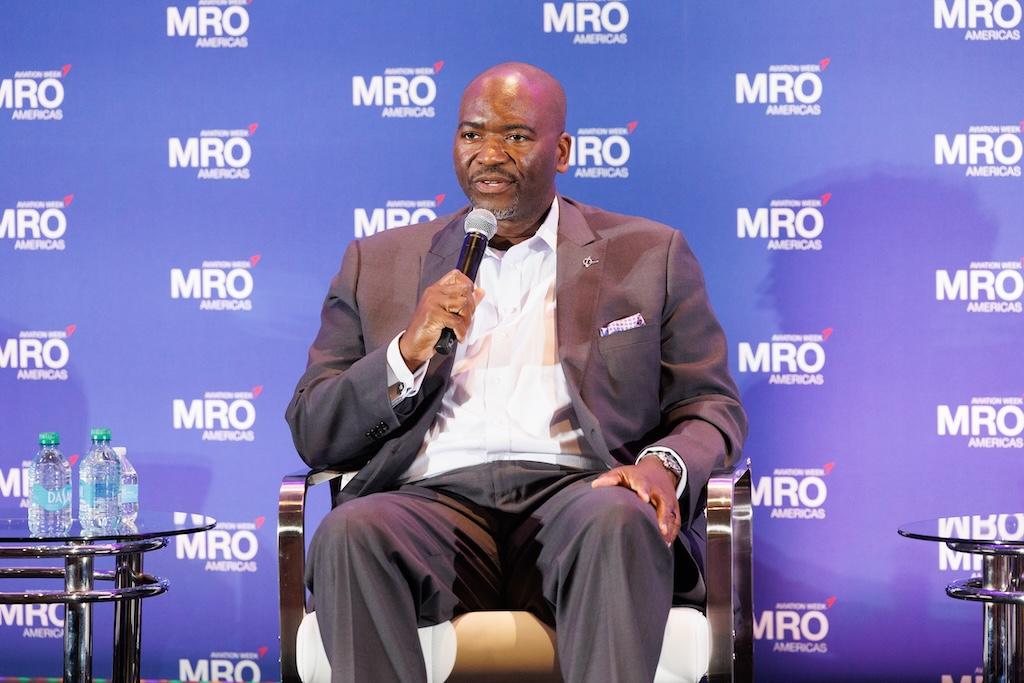
William Ampofo, Boeing SVP, discusses tariff implications for supply base during MRO Americas.
ATLANTA—Concerns around potential cost escalations in moving parts across borders and the labor market were cited by industry figures as the commercial aftermarket weighs up the ramifications of Trump administration tariffs.
Speaking at a panel on supply chain resilience at MRO Americas in Atlanta this week, OEM, airline and parts specialist representatives voiced their concerns about the uncertainties of U.S. trade policy with a consensus that many are playing a waiting game as the present situation remains hard to predict.
Among these is Boeing, the U.S.’s largest aircraft manufacturer. “I can't predict, and I don't think anyone can in this environment, but I would say that we're concerned,” says William Ampofo, senior vice president parts & distribution services business and supply chain at Boeing Global Services. “We should all be aware and be prudent. We're in the process right now of sizing what we think the potential risk may be to us [the Boeing company]."
The OEM could see cost escalations for parts. “In our supply base, obviously we've got some suppliers that are fighting force majeure or looking at surcharges and opportunities to pass those along, but it's early stages,” he adds.
Others hold immediate concerns about cost escalations in an already inflated labor market. “We do heavy maintenance down in Mexico, and we do engine overhauls in Germany, so obviously you're importing labor, and there'll be a surcharge for that so that will directly hit our bottom line from a cost standpoint,” says Michael Bruhn, vice president finance and supply at regional carrier PSA Airlines, a subsidiary of American Airlines. “In an already fragile supply chain environment, it's going to affect the entire thing from the perspective of raw materials that go into components.”
Like Boeing, U.S.-based parts supply specialist HEICO is also assessing a situation which remains unclear. “It’s still very much in early days and we're trying to figure out what is going on,” says Patrick Markham, vice president HEICO parts group technical services.
Markham says HEICO finds itself in an interesting position given it operates companies in both the U.S. and Europe. “Since aerospace has largely historically been tariff free, this is something that's relatively new for us throughout the entire industry, because until now, it's been relatively easy to move material from one side of the Atlantic to the other without imposing heavy fees,” he says. “If we've got warehousing facilities that are in the UK or in Europe, does it make sense to not bring the parts across to the U.S. if they're going to go back over there? How do you deal with all of that stuff?” However, Markham remains bullish about the industry’s resilience in the face of tariffs and believes it will adapt to whatever scenario plays out. “It's just going to be a question of making sure we have availability when we need it, and then figuring out how much it's going to cost,” he adds.
Steve Roberts, managing director engine programs and materials at New York-headquartered JetBlue, anticipates shifting dynamics in airline maintenance strategies in a tariffs environment. He predicts repair versus buy activity increasing and a lot more attention from carriers towards the DER and PMA parts market. “The more you can avoid scrap and repair that's going to drive an advantage, especially if you can do that locally or closer to home,” he says. Roberts also predicts USM prices, which have seen significant spikes in the past few years, to increase further as a result of tariffs.
“Local or nearshored USM is going to react to these types of tariffs, particularly in the near term. I also anticipate seeing more tear downs. They [tear downs] will become more lucrative if you can eat your own fleet to get through, buy yourself some time, or partner with somebody to do so,” says Roberts.





